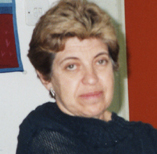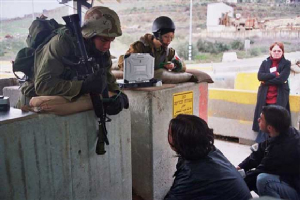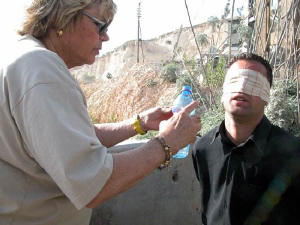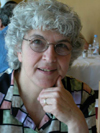|
|
 |
|

|
| Yehudit Keshet |
By Yehudit Kirstein-Keshet
Reprinted with permission from Hedva Isachar, Sisters in Peace, Feminist Voices of the Left (published by Resling in 2003 in Hebrew)
This text was written in 2002; in 2006, MachsomWatch has
about 500 members in groups throughout Israel.
|
 |
Fear
is not rational; traveling in a bus is much more frightening to me than going to the checkpoint. At the checkpoint, I feel no fear.
We
began our activity in January 2001 as reports began to pour in of human rights violations at the checkpoints, especially incidents
in which sick people and women in childbirth were prevented from reaching the hospital.
We were three women: Adi Kuntsman, an immigrant from the former Soviet Union, who is now my life-partner, Ronnee Jaeger
who comes from Canada, and me.
We
all thought that if we Israeli women would be present at the checkpoints, that would have a good influence on the conduct
of the soldiers. I knew of no models from other countries, although Ronnee had
previously done something similar in Guatemala. There observers would go to the border and observe how the soldiers treated civilians. We decided to do that here because we thought it was a good way to protest the occupation,
in the sense that the checkpoint is the manifestation of the occupation. The
checkpoint is where average Palestinians – not the suspected terrorist, but ordinary men or women trying to live their
lives – meet the occupation on a daily basis. A Palestinian can reach the
checkpoint with his identity papers and a permit to cross, if he actually gets one, and still not know if he will be allowed
through. The Palestinian is expected to obey the orders of an 18- or 19-year-old
soldier. Sometimes the orders are given politely, and sometimes rudely. The Palestinian at the checkpoint has no idea what he or she will encounter. They don’t know if they will be delayed for hours at the checkpoint for one
reason or another, or if they will pass through easily, or if they will be taken aside and abused (which doesn’t necessarily
happen when we are around, but we know it does happen).
At
the checkpoint, the average person encounters the occupation. That's why the three of us started to think about it. I
don’t remember which of us suggested the name Machsom [checkpoint] Watch. Perhaps
unconsciously we were thinking of an organization like Human Rights Watch in the United States, but we did not set up a structured organization or even register
as a non-profit. We were simply a group of volunteers with a political credo.
The very first
time, five of us went to a checkpoint and we disagreed about what to do: Two
wanted to demonstrate our presence to the soldiers, making a clear statement that we had come to observe. Another suggested that we observe, analyze, and plan carefully what to do.
We arrived at the Bethlehem checkpoint, which is one of the larger ones in the Jerusalem area. It borders
on what was formerly Area A and therefore is a very active checkpoint, manned by soldiers and not the Border Patrol. We were there at five or five-thirty in the morning and it was very cold. A young soldier standing there said to us, “What are you doing here?
You can’t stand here.” I said to him, “You know what? We came to see the sunrise.” “The
sunrise?” he replied, “You crazy ladies, it’s dangerous here.”
But he let us remain and watch the sunrise, and when he was occupied with his friends, we passed through the checkpoint
and inspected the other side. No one was waiting to cross at such an early hour
– don’t forget that this was in January 2001.
Since then,
the situation has changed a great deal: The checkpoint is much more sophisticated and has been turned into a kind of border
crossing. If they set up a proper border crossing here, one that would serve
people, it would be fine, but the way people are treated who pass through this
checkpoint, and others, is indecent.
The
checkpoint is about 200 yards long. Palestinians who want to go through
must take a cab to one side, get out, walk through the long and winding path until they reach the soldiers’ post. There they are checked, and must walk another 150 yards or so until they reach the
cars waiting on the other side. It’s the same in both directions. (By the way, the soldiers check people entering the Palestinian territory, too, not
just those entering Israel).
We
stood there that first morning and didn’t know what to do or how to do it, but we wrote down everything we saw into
our notebooks. The idea sparked interest and within a short time thirty more
women joined us. Today, three years later, we have almost 200 women who regularly
monitor the checkpoints twice a day every day. [In 2006 there are about 500 women
- gs]. Decisions are made by the organizing group, which has eight or nine
women. We monitor the checkpoints at the entrance to the four permanent checkpoints
surrounding Jerusalem.
We also manage to reach distant checkpoints deep inside the territories.
Our
goal is twofold: First, our very presence challenges the security-oriented ideology
of the state of Israel. Every single day we see with our own eyes that there is absolutely no connection between checkpoints and
security. Checkpoints only provide Valium for the Israeli public, while they
mean considerable distress and harassment for the Palestinian population. In
fact, whoever is determined to pass through a checkpoint will get through sooner or later.
The army claims that it has managed to catch people planning terror attacks.
We don’t argue with the army, but point out, “We are citizens and you are accountable to us. We came to see what you are doing and you have to explain to us what is happening here.” It’s not enough for them to say, “Security, security”; we demand explanations.
We
wear a large, identifying button that can be seen from a distance, and when we arrive at the checkpoint, we always approach
the soldiers and tell them that we are from MachsomWatch, a human rights organization, and we are there as observers of the
checkpoint. Only infrequently do we encounter serious resistance. The attitude toward us is not friendly. It’s a little
disdainful, a little indulgent. Most of us are women over the age of 35, and
they treat us like dotty old aunties.
* *
*
MachsomWatch
is a women’s movement, and part of the Coalition of Women for Peace. We
regard our activity itself as part of our message – when we stand up and confront the army, that in itself is a message. The activity empowers women who join us. Because
we are not part of the establishment or its security-oriented thinking, we have an advantage over men, because we deal with
soldiers without quarreling with them. Therefore we do not have men in our monitoring
teams, even though a number have asked to join. Their participation would change
the character of the action and involve us in the military discourse that men are part of, despite our opposition, and we
want to avoid that. I don’t think that a man can be at a checkpoint and
not identify with the soldiers. At any rate, this is a feminist action, and women
need a place to be active on their own, without men.
A
monitoring session at the checkpoint lasts for three to five hours. It’s
important to note that we do not intervene with what is happening, except for clear cases of abuse or injury: If soldiers delay an ambulance or hit someone, then we intervene.
We approach the soldiers and ask, “What are you doing? Why are you
doing it? How are you doing it?”
I was witness to very few such scenes, but I have seen a great many Palestinians arrested, especially laborers who
are looking for work and trying to cross without a permit. They are hunted down
with tear gas, like animals…It’s hard to describe. Border Patrolmen
in jeeps chase these people down into the gulches, across fields, and into the streets of Jerusalem,
and when they catch them, they hold them for several hours at the checkpoint or in the city, for no reason at all, just to
teach them a lesson. Then they are often sent to the checkpoint where they have
to wait to get their identity papers back. When this happens, we try to get them
freed as quickly as possible. They are forced to wait there in every type of
weather, without food or water, without a sheltering roof. It doesn’t sound
as horrendous as the cases you hear about in the news, but it’s very hard for people who have to wait there. Sometimes you see fifty men detained at the checkpoint, and no more than three to five soldiers dealing
with them as well as with those crossing. And you ask yourself, “How can
it be that all these Palestinians are waiting in line so quietly?”

|
| MachsomWatch woman observing at Hawarra checkpoint |
|
 |
|
|
|
 |
Although
the image of the woman giving birth has become the most vivid symbol of the cruelty and arbitrariness of the checkpoint, it
is not only women in labor, but also the ill who are held up at checkpoints and fail to receive timely medical treatment. This is rather frequent, but not at the checkpoints where we station ourselves, because
these are near a big city, where Palestinians are familiar with the constraints. These
problems usually happen at the small checkpoints within the territories.
We
visited several small checkpoints and witnessed appalling behavior on the part of the soldiers. These are usually young recruits, and they see themselves as kings of the hill. In one location, we met a unit that was created especially to work the checkpoints. I believed that while we are present at a checkpoint, they don't abuse the Palestinians, because the soldiers
are well aware of the media attention it would get. However, with time our teams have witnessed beatings, shootings and prevention
of medical care while on duty. It is not our intent to anger or provoke the soldiers,
but to observe what happens. The importance of this activity is documentation
of the very routine, the dark reality of daily life at the checkpoints. We do
not argue with the soldiers because our protest is not against them. Our argument
is with the decision makers, those who bear responsibility for this situation.
Over
the course of time, two activist women left our ranks because they felt that our activity was detrimental to the soldiers,
and one other woman left because her family objected strongly to us. However, the majority remain.
Would
you like to hear about one particularly powerful image from my checkpoint experiences?
I’ll tell you one. It happened during the last Ramadan. We arrived at the Bethlehem checkpoint for our regular monitoring, and saw a large group
of Palestinians waiting at the checkpoint, some leaning on walking sticks. Most
of them looked roughly in their sixties or even older. The place was filled with
Border Patrolmen and jeeps, while the Palestinians simply stood there in absolute silence, waiting to be allowed to cross
to the Jerusalem mosques for Ramadan prayers. We were prevented from approaching the Palestinians because the area was declared a closed military zone. From the opposite direction, the Jerusalem side, a
bus suddenly appeared with Jewish worshipers headed to Rachel’s Tomb in Bethlehem. The soldiers moved the Palestinians aside, opened the checkpoint, and allowed the
bus to cross with full military escort. Afterwards, they again closed the checkpoint
and the elderly Palestinians stood there in absolute silence. From a distance
they could see Jerusalem and its mosques, but they could not
get through. This was one of those instances that really shattered me. I can’t forget that scene. It reminded me of other places
and other times. It was so cruel and so senseless. We went to the soldiers trying to convince them to allow the Palestinians to pass, but they said that they
had received advisories that it would be dangerous, and that this was an absolutely closed military zone. The fact is that the Jews entered and we were helpless. I
felt an enormous sadness that Jews would behave this way, in a mix of collective punishment, pure racism, violation of freedom
of worship, and cruelty. I repeat: cruelty.
* *
*
My
modest contribution to resisting the occupation can be said to be the work I do in MachsomWatch. I was not active at all during the first Intifada, even though I come from a left-wing background. For a while I was a member of the Communist Party in England, where I was born, and active in human rights organizations. My real activism began after Benjamin Netanyahu was elected prime minister.
At that time, I became free of my work as an organizational consultant and had enough time to devote to activism, and
I took early retirement in 2000. I am also a member of the board of the Public
Committee Against Torture in Israel, and somewhat active in the Israel Committee Against House Demolitions. In 1996 I began political activism when I joined Bat Shalom, and as a result I began to develop a sharper
feminist consciousness than I previously had, as I had not defined myself as a feminist.
I had then defined myself, above all, as a political activist in the field of human rights.
I
grew up in an Orthodox Jewish home, and to this day I am religious, more or less. I
say ‘more or less’ because I don’t maintain a rigorous routine of observance. My parents had been refugees from Germany who went to
England prior to World War II and belonged
to a very special group of German Jews called, Torah Im Derekh Eretz [Jewish law with respect for others]. I was born in England
and grew up in an atmosphere that emphasized the moral aspect of Judaism, one that I am no longer sure exists. The first time I came to Israel
was in 1958 with Youth Aliyah, which was not common for youth from English-speaking countries.
I was fifteen years old and a passionate Zionist from childhood, who believed that we were creating in Israel a society that would be enlightened, just, egalitarian,
beautiful, and Jewish. I will say parenthetically that I still believe this is
possible, and therefore I do what I am doing.
But
after a year in Israel, I realized that I seemed to be less Zionist than
I had thought, or that Zionism was not what I had envisioned, and I returned to England. When I was eighteen I joined the Communist Party, but was thrown out of it in 1967
because I was considered too Zionist. Before that war broke out, I was planning
to go back to Israel. I gave birth to a son and thought to raise him in Israel,
but then the war broke out and I decided not to contribute to the occupation. Yes,
already in 1967 that’s what I thought. In England, especially among the left-wing British, people were very sensitive to
the occupation because of British colonialist history.
The
Yom Kippur War returned me to Israel. Two very close friends of mine were killed in action and I thought, okay, they are
coming to destroy us and one must be there. I was overcome by a surge of Zionism
and returned with the conscious decision to remain in Israel,
no matter what; that one cannot continue to have this kind of back-and-forth relationship.
I decided to settle down without thinking, “I’ll see if I like it or not.” Naturally a great many things were not to my liking: It was hard for me to adjust to the mediocrity and
the general chauvinism, but I decided to remain, and I did hold on, more or less. I’m
not sorry that I stayed, and I see a religious aspect to my political activism on behalf of human rights. Clearly it is part of my religious self.
* *
*
I
made up my mind to end this occupation no matter what. I hate demonstrations. I find them to be useless. My choice
is to somehow dig underneath and undermine the existing structure. I see this
as a kind of civil resistance. We saw how this happened in Eastern
Europe when the Communist governments collapsed, a million people flooded the streets to tear down the Berlin
Wall. This is the type of activism that should be roused, and I am working for
the day when millions of people will show up and dismantle the checkpoints with their own hands and that’s that, finished. That day is still far away.
I don’t even want to think about what still has to happen before that day comes, and
that’s why I am pessimistic. I think that our minds are closed to any real
possibility of a solution, because in my opinion there is no alternative but to end the occupation, retreat from all the territories,
and dismantle the checkpoints. None of this can happen if we don’t view
the Palestinians as a nation with the right to self-definition, the right to exist with dignity as a nation, and the right
of return as an equal value for both nations . This awareness is completely lacking
among both Israeli decision makers and the public.
Translated
by Gila Svirsky

|
| MachsomWatch woman giving water to a detained Palestinian |
Since this chapter was written, Yehudit Kirstein-Keshet published CheckpointWatch: Testimonies from Occupied
Palestine, Zed Books. London, 2006, and Palgrave-Macmillan, New York, 2006.
|
 |
|
|
|
|
"I’ve found that there are times in a person’s spiritual journey when prescription drugs
are entirely appropriate.” Barbara Smaller, New Yorker, 14 February
2000.
|
|
|
 |

